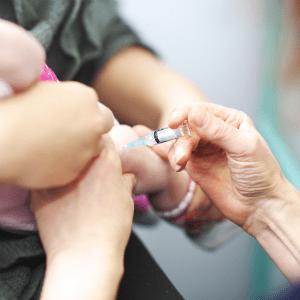GPs in England are being tasked with vaccinating newborn babies who may be at high risk of contracting hepatitis B against the disease, under a new programme starting this year.
Under the new service, practices will be responsible for checking that at-risk babies on their register have had the first dose of hepatitis B vaccine – which should ideally be given in hospital after birth – and then ensuring they also complete the three remaining doses at one, two and after 12 months.
Practices will be paid £7.64 for each of the three (or four, if the first is not done in hospital) doses they deliver.
The GPC said hospitals would usually provide the first vaccination to babies who may be at risk, which includes those whose mother has hepatitis B, and inform the mother’s practice or intended practice.
But Dr Charlotte Jones, the GPC’s new co-lead on vaccinations and immunisations, told Pulse GPs would need to be mindful that some mothers may not have registered with a GP or informed the hospital who their GP would be.
Related stories
In full: Unplanned admissions DES specification
GPs given ‘key role’ in improving hepatitis B
GPs to lead catch-up campaign offering meningitis booster vaccination to university entrants
Dr Jones said: ‘The hospital will advise the patient’s registered GP, where they know who it is. But practices should be proactive about making sure those that are high-risk have it.
‘It’s a difficult one – there may be some mothers who have not chosen their registered GP or don’t tell the hospital who their GP is. My advice to practices would be to be mindful of it – and don’t rely on hospitals informing practices.’’
Dr Jones, who is also Welsh GPC chair, said although the new programme is only being introduced in England this year, it was likely GPs in Wales and the other devolved nations could be expected to follow suit in the future.
A spokesperson from Public Health England (PHE) explained the process of vaccinating babies born to hepatitis B-positive mothers had been in place since 2000, but this is the first year GPs would be paid to vaccinate babies under the SFE.
PHE said few eligible babies would miss the first dose, and GPs could safely administer an extra dose if they were uncertain whether if the first had been given or not.
The spokesperson said: ‘There will be very few babies who miss the first dose at birth. When the healthcare worker or midwife sees the child for the newborn blood spot screens (at day five after birth but could be up to day 17), they should check the child’s red book to see if they were eligible for hep B vaccine and received the first dose; if no vaccine was given they can be referred to the GP for vaccination.
‘If the GP is not sure if the child was vaccinated (ie, not in the hospital discharge summary or red book) the GP should confirm with the maternity unit. In the rare occurrence that the GP cannot confirm vaccination was given, they can administer an extra dose as the critical doses are those given at birth and one month.’
One other new vaccination programme introduced this year is an enhanced service for the meningitis C booster vaccination for new students arriving at university.
In addition, the pneumococcal vaccination programme has been updated to include those vaccinations given to under-65s in clinical risk groups in the DES, as well as those given to the over-65s cohort, while additional cohorts have been added to the routine shingles vaccination and childhood flu vaccination programmes.
Pulse July survey
Take our July 2025 survey to potentially win £1.000 worth of tokens












